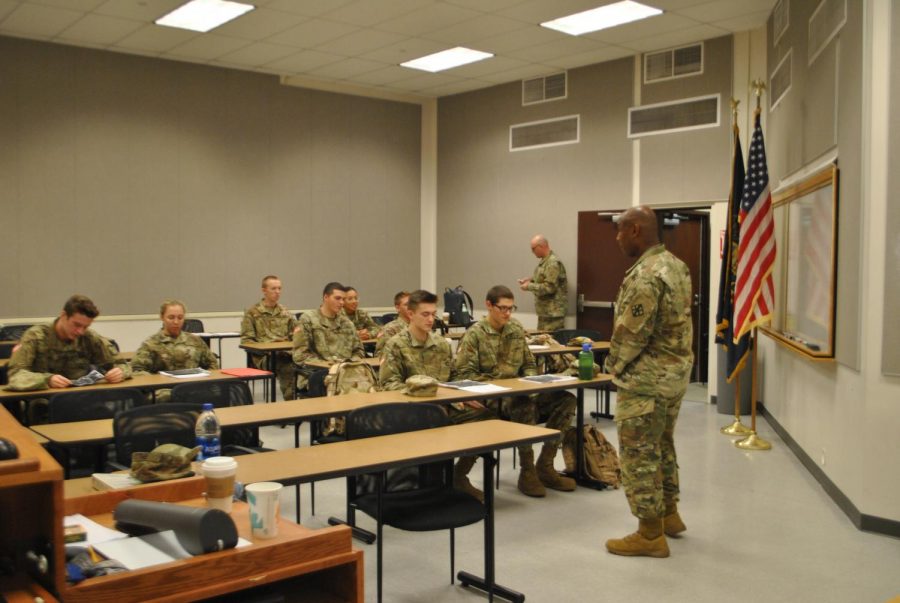ROTC gets 13 cadets, more expected
Major Bruce Jordan (right) instructs cadets in their one Pitt-Johnstown lecture, covering topics such as weapons systems and land navigation.
October 24, 2018
The Army ROTC is back on campus with 13 cadets.
According to ROTC instructor Maj. Bruce Jordan, Pitt-Johnstown’s branch is part of the Indiana University of Pennsylvania’s Warrior Battalion.
The battalion now also includes ROTC branches at St. Francis University and Mount Aloysius College.
“If cadets complete all four years of ROTC, they will have the opportunity to serve their country as an Army officer on active duty, or in the Army Reserve or a state National Guard,” Jordan said.
“The ROTC program assists students in areas such as leadership, values, responsibility and discipline.
“The program has been touted by numerous organizations for its ability to assist students (in) graduating, focus on future endeavors and maintain national pride.”
Freshman cadet Sam Van Dermark said he has one lecture Wednesdays, a lab at IUP Thursdays and physical training early Monday, Wednesday and Friday mornings.
“ROTC trains students to commission into the military as a second lieutenant upon graduating. That means learning about land navigation, moving tactics, how to boost morale, weapons systems, etc; everything a military officer needs to lead soldiers,” Van Dermark said.
Van Dermark said cadets also participate in field training exercises, including one at Camp Dawson, West Virginia. While there, he said they ran obstacle courses, used an engagement skills trainer and rappelled off a 60-foot tower.
Van Dermark said there are scholarships available for cadets, including two- and four-year scholarships, and not just for active duty cadets or cadets with active-duty parents.
“The Army is looking for educated people to serve, and they are willing to give money to those people.”
Freshman cadet Madison Clapsadle said she participated in JROTC in high school, and found out about Pitt-Johnstown’s ROTC program at Accepted Student’s day.
She said she was convinced to try the program for a semester, and she likes it a lot.
“I think it’s a lot of fun. We, as a unit from (Pitt-Johnstown), are starting to come closer,” said Clapsadle.
“The whole family environment is great. We hear stories from our instructors about how they have lifelong friends that they’ve served with. Family is really important to me.”
Clapsadle said Pitt-Johnstown’s 13 cadets include three with prior service.
Jordan said that the program attracts students from all walks of life, but that, currently, there are only freshman cadets at Pitt-Johnstown.
“There are students who want to serve their country, there are those who follow in family members’ footsteps and those who simply need a way to pay for college.
“All are noble reasons for joining ROTC, but, eventually, they stay because of what they get out of ROTC. The growth of a cadet is an amazing transformation,” Jordan said.
“All are welcome as first-year cadets, provided they are willing to accept the rules of ROTC. There are no physical requirements for an uncontracted cadet.”
Jordan said that a cadet can join with no long-term commitment, but, by junior year, the cadet must either contract or drop out of the program.
“I believe if you attempt it and give ROTC an honest attempt, it will be very rewarding for most people.
“Once the cadet contracts, there is a physical fitness requirement to remain in the program,” he said.



